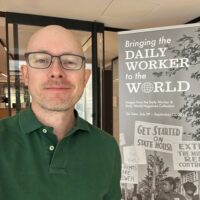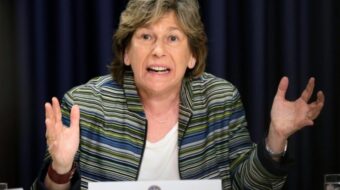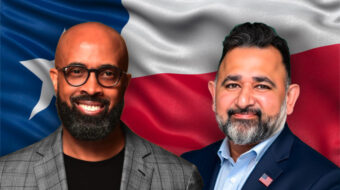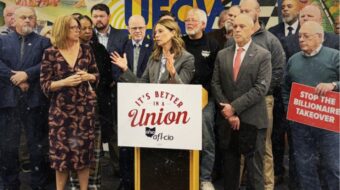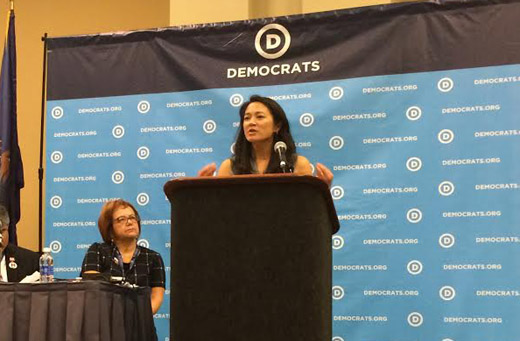
This article is part of a series on the Democratic National Convention.
PHILADELPHIA – At the first ever meeting of the Democratic Party Labor Council at a party convention, trade union delegates met Monday to discuss the immediate electoral task of defeating Donald Trump and electing Hillary Clinton, as well as the longer term necessity of finding a more equitable economic development model for the country. The 2016 Democratic Platform was praised as a good start toward what has to be done.
Richard Trumka, president of the AFL-CIO, and Felicia Wong, head of the Roosevelt Institute think tank, told the assembled delegates that the progressive movement had to “rewrite the rules” of the economy so that the benefits of growth are shared more broadly. Achieving such a goal, they said, requires the election of progressive candidates up and down the ticket this November and beyond.
Clinton answered the call
Introducing a discussion on electoral and economic strategy, Trumka said, “The economy is not like the weather; it doesn’t just happen to us.” Emphasizing the importance of winning political power, he told delegates to remember, “Those who write the rules set the terms and conditions of the free market, and for forty years, those rules have been written against us.”
The 2016 election was highlighted as an opportunity to not only hold onto the White House, but to make gains in Congress and start building a “rising wages economy.” Trumka characterized this year’s Democratic Party election program as “the strongest pro-worker platform since FDR.”
Characterizing the Democratic primary race as a positive competition overall, the labor leader referred to the AFL-CIO’s Raising Wages Campaign as the standard by which unions have measured presidential candidates and others.
“We said anyone who wants our support must bring forth a bold commitment to a pro-worker agenda,” Trumka said. Though the federation chose not to make an early presidential endorsement, Trumka told delegates that the path ahead was now clear for all to see.
“Hillary Clinton has answered the call,” he declared. “The choice between Clinton and Trump is a no-brainer.”
Clinton not only came out against the Trans-Pacific Partnership (TPP), which labor opposes, “she calls for a whole new direction on trade,” Trumka announced. At the Democratic candidates’ debate in February, Secretary Clinton declared that the global economy thrives on trade, but said that the U.S. government has previously “failed to provide the basic safety net support that American workers need.”
Trumka reminded union members that “Old Donnie Trump,” by contrast, “embodies everything wrong with our economy.” The Republican nominee, Trumka said, “personally profited from NAFTA, tells Trump University students that outsourcing creates jobs, and he bullies the workers in his own companies.”
Rewriting the economic rules
Continuing on the themes highlighted by Trumka, Felicia Wong of the progressive think tank Roosevelt Institute, presented a three-part agenda for solving the problems of shared economic growth. She said that to win long-term change, progressives need to change not only the rules of the economy, but also the rule-writers. “Union members, the youth, people of color, and others need to not only influence the process, but get involved and do the writing themselves.”
The Roosevelt Institute, which was the subject of a feature article in the New York Times Magazine this weekend, is dedicated to continuing the legacy of Franklin and Eleanor Roosevelt and incubating ideas to create opportunity for all.
Joseph Stiglitz, chief economist at Roosevelt, authored the book, Rewriting the Rules of the American Economy, which laid out the extended strategy Wong discussed. The strong parallels between the Roosevelt program and Clinton’s agenda in this election should come as no surprise, since Stiglitz has served as an economic adviser to the Secretary.
Wong said the first goal of the program must be to rebalance power at the top, specifically that of corporate and financial capital. She noted that profits for the financial sector have increased by three times since the 1980s and that compensation for the top one percent increased by 183 percent over the same period, while wages for everyone else had been relatively flat. The extreme concentration of power at the top, she said, “is unhealthy for us all.”
Secondly, Wong focused on the need to improve the labor market. “That means full employment, achieved through the treasury if necessary, stronger unions, and raise the wage campaigns.” It is about creating jobs that pay enough for people to care for their family, she argued, “not just a better tax and transfer system.”
Finally, the Roosevelt head said that any new model of economic growth must have public infrastructure investment at its core. “It goes beyond roads and bridges,” she said, “it has to include modern infrastructure – broadband, smart grids, high speed rail, and also investing in people.”
“If the power at the top can be rebalanced,” Wong explained, “you can reset all the rest.” The government has to play a role to make sure that investments are being made for the future. Rewriting the rules, then, “is not just economics, but a matter of political power.” She said that fundamentally, the 2016 election and long-term strategy for the progressive movement have to be considered through the lens of political economy. “It’s a class argument,” she said, “but you can’t ignore the racial aspect as well.”
The joint union-think tank panel discussion was part of a DNC first. This session marked the convention debut of the Democratic Party Labor Council, a new permanent body dedicated to guaranteeing a place at the table for workers within the official structures of the party.
Trumka and Wong’s message of going all out for November and devoting long-term energy toward rewriting the economic rules signaled a new level of cooperation among different components of the progressive coalition.
Photo: Felicia Wong, president of the Roosevelt Institute, addresses DNC delegates at the Labor Council meeting in Philadelphia, July 25, 2016. | C.J. Atkins/PW


